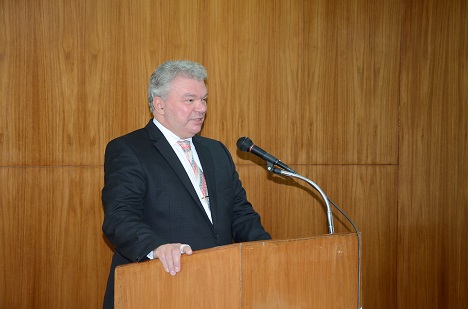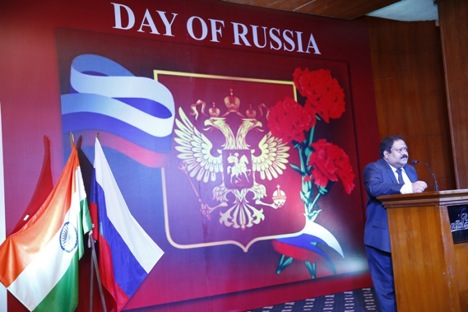RCSC celebrates turning 40 in Mumbai

Vladimir Dementyev, Director of the Russian Centre for Science and Culture in Mumbai.
Alessandro BelliHow will you celebrate this jubilee? Is something special planned for the occasion?
A plot of land was purchased for this centre in 1972. The building was completed in 1975. The centre was opened by then Minister of Construction of Heavy Industry of the USSR, Nikolai Goldin. The centre will celebrate its Ruby anniversary (this is what they call a fortieth anniversary in India) on November 19, 2015. The Russian Ambassador to India H.E Alexander Kadakin will pay us a visit. He has visited Mumbai and the RCSC Mumbai on many previous occasions, but for reasons that were not related to the anniversary of this centre. As our Indian senior employees told me, it will be the first visit by a Russian Ambassador to India during an anniversary of the Centre, in its entire history. We understand how difficult it is for him, with his overloaded schedule of meetings and negotiations, including at the highest levels, to find time for the RCSC, and so we are greatly honoured by this visit.
On November 19, the RCSC will host a meeting between people of the city and the concert band Stanitsa (Cossack village) from Krasnodar Krai.
Mumbai is the financial and cultural capital of India. Located here are major banks and film studios of the country, and the country’s only symphony orchestra. How does this reflect on the work of the RCSC?
It sets the bar very high for our work. Nothing can be done half-heartedly. The intellectual elite of Mumbai are so highly educated that they quickly notice any inaccuracies. I recall how when we staged a major exhibition; to provide informational support for the decision of the Crimeans when they voted to join Russia in a referendum; entitled ‘Palaces of Russian Tsars and Princes from St. Petersburg to Crimea’. This had stunning effect on Indians, and many leaving the exhibition said: “We now realize that Crimea is a land of Russian culture.”
When I was giving an explanation about the Yusupov Palace to Sumeet Mallik, Chief Protocol Officer of the Maharashtra Government, and told him that during the Yalta Conference Joseph Stalin and Vyacheslav Molotov stayed in this palace, Mr. Mallik asked, “Molotov was a Jew?” I replied, “No, his wife was a Jew, and Molotov’s real surname was – Skryabin.” It does not matter that Mr. Mallik made a little mistake; one must agree that not every official is versed in the nuances of the history of other countries. The Chief Protocol Officer of Maharashtra is also a writer, philosopher, and intellectual.
The RCSC in Mumbai and I personally enjoy great friendships with Randhir Kapoor, Kiran Shantaram, and other filmmakers in Western India. The businessman and philanthropist rolled into one, president of the National Center for the Performing Arts, Mr. Kushru Santuk, thanks to whose efforts in Mumbai appeared India’s first and only professional symphony orchestra – is also a good friend, with whom I hosted a grand photo exhibition on F.I. Shalyapin. We should remember that it was through such names as Khwaja Ahmed Abbas and Raj Kapoor that Soviet people learned about India and its people. It was through Mumbai, while still bearing the name of Bombay, that Russian culture was enriched with knowledge about India.
You know that in Russia many do not celebrate their 40th birthdays. I would like to ask you to look at this date as the entry into the final stage of a half-century of activity. What are the goals/challenges that face the RCSC, so you can look back with pride?
The Russian press, which reflects views of a certain part of the elite and society, are often very critical while describing the activities of Russian Centres of Science and Culture abroad. About our centre in Mumbai, I can say with pride that the Andrey Tarkovsky Cinema Club operates here. Twice every week, Indians get to watch masterpieces of Soviet and Russian cinema here (films dubbed either in English or with subtitles in English). The TV channel Russia Today broadcasts 24/7 here, the RCSC Library in Mumbai has 15,000 books in Russian, English, Hindi, Marathi and Urdu, and every month it is replenished with 10-15 new volumes. Studying in our ballet studio are 130 young dancers, and our Russian language courses provide excellent knowledge and skills. Compatriots come to visit us as they would their family home, and our concert programmes gather full houses.
With what is the RCSC approaching its 40th anniversary? What new things have been achieved over the past few years?
For 35 years, no repairs were done to the House of Soviet Culture (HSC), later the RCSC, as almost no funds were allocated for this purpose. Today the concert hall in the centre is in excellent condition, the lobby, conference hall, and roofs have been renovated. New surveillance systems, metal detectors and other security measures, in this era of terrorist threats, have been installed. The RCSC Mumbai has a newly re-furnished reading room. Overall, the material base has been significantly refreshed, and the financial reporting has been fully computerized. The RCSC carries out its work in ten various directions, but the main one here is methodical. Visitors come to the center in the mornings, afternoons and evenings. The most regular breakdowns experienced during the past five years occurred in the mechanism for opening and closing of the gate. The technology simply could not handle the number of visitors. But the popularity and demand for the centre is the essence and purpose of our work.
Why, after the collapse of the Soviet Union, was the RCSC unable to establish communications with the filmmakers?
That is not correct. With our support, Days of Russian Cinema, organized by Nikita Mikhalkov and the Russian Union of Cinematographers was organized in Mumbai. Partners of RCSC in Mumbai are Mosfilm and creative associations from various cities of Russia, and these have repeatedly brought cinema starring brilliant artists such as Viktor Sukhorukov, Lyubov Tolkalina and others. Contacts between filmmakers from different countries must be established independently. Our role is to let them know about each other, to build interest.
Public authorities in Mumbai and Maharashtra are very friendly towards foreign culture. Do you feel this in your work?
RCSC Mumbai closely coordinates its work with the Russian Consulate General in Mumbai. I was lucky in seven years here to have worked five and a half of these with Consul General Alexey Novikov, a brilliant diplomat with an unusually broad mindset. Any possible problems in our direction, we were able to nip in the bud. Diplomats should be able to find common points of contact with all the leading political forces in the country. Any Indian will tell you that Russia has always stood on the side of India, and has saved it many times. I feel only extraordinary love from ordinary Indians towards Russia, its President, and its people. In such circumstances, it is easy and enjoyable to work here.
The Russian language teacher and translator Suniti Deshpande passed away. Do you think that Russia is doing enough to bring a worthy replacement here?
Suniti Deshpande was a living legend. She was one of the first Indian graduates of the Pushkin State Russian Language Institute in Moscow. Supervisor of her thesis and mentor was Academician V.G. Kostomarov. Ms. Deshpande spent 27 years working as head of Russian language courses in this centre. She passed away two months ago, at only 60 years of age. Her life can be compared to a comet clearly tracing its path in the skies. During the celebrations of RCSC’s 40th anniversary and the 90th anniversary of Rossotrudnichestvo, in the foyer of the centre, we will show a documentary film about Rossotrudnichestvo. The English version and narration was made by Ms. Deshpande. This was her last work – and our guests will be able to hear the voice of Suniti. She was not only a teacher of the Russian language and in charge of the courses, not only translated Russian classics into Marathi and other Indian languages, but also a brilliant journalist. Her articles were published in such newspapers as ‘Saamna’, ‘Loksatta’, ‘Prachar’, ‘Mi Marathi’, and others. After such a legendary woman, it was difficult to find a worthy replacement. We have chosen the bold Indian journalist Vidya Svarga Madani, who was not afraid to travel to Crimea, and to tell the truth about the Crimean referendum and the aspirations of the Crimean people. Vidya is a graduate of the Voronezh State University, a patriot of Maharashtra, and she, with her usual courage, accepted my offer to head the Russian language courses at the RCSC in Mumbai. For India, it is time to review the list of recommended books in the Russian language (these still describe the communist paradise), and create for the Russian language equal conditions that exist for other foreign languages (compulsory examinations, etc.).
What would you wish for the RCSC on this special occasion?
I would wish for it to keep developing and not stand still. We can speak about the digitization of the library fund, and the replenishment of the film library, the expansion of the work of Russian language courses, new studios for dance, music, and so on, but the main wealth of any organization is its people. Let new, young and talented people come to the RCSC, who love Russian culture, and have solid knowledge in various fields of science and life.
All rights reserved by Rossiyskaya Gazeta.
Subscribe
to our newsletter!
Get the week's best stories straight to your inbox
